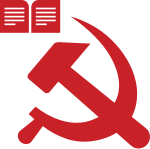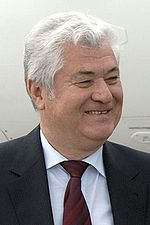Communist Party of Moldova
| Partidul Comuniștilor din Republica Moldova Party of Communists of the Republic of Moldova |
|
|---|---|

|
|

|
|
| Party leader | Vladimir Voronin |
| founding | October 22, 1993 |
| Headquarters | Chișinău |
| Youth organization | Komsomol Moldova |
| Alignment |
Democratic socialism communism |
| Colours) | red |
| Parliament seats |
0/101 |
| International connections |
UdKP-CPSU International Meeting of Communist and Workers' Parties |
| European party | European Left (EL) |
| Website | www.pcrm.md |
The Party of Communists of the Republic of Moldova ( Romanian Partidul Comuniștilor din Republica Moldova , PCRM; Russian Партия коммунистов Республики Молдова ) is a Moldovan political party . It is the only communist party that had a majority government in a successor state to the Soviet Union .
history
After turning away from the communists in the 1990s, the first years of Moldova's independence, the Communist Party achieved a political renaissance in the 2001 parliamentary elections in Moldova . It won over 50% of the vote and, due to the electoral process ( D'Hondt procedure ), more than two thirds of the parliamentary seats.
In the 2005 parliamentary elections she received 46.1% of the votes cast and 56 seats. It remained the sole ruling party and continued to provide the president (the party leader Vladimir Voronin ), the head of government ( Zinaida Greceanîi ) and the parliamentary speaker ( Marian Lupu ).
In the parliamentary elections in 2009 , the communist government was again confirmed in office, although the government was expected to be punished due to the difficult economic situation. The PCRM received 49.5% of the votes and was able to expand its parliamentary majority. It just missed the three-fifths majority required to elect the president and is therefore dependent on at least one vote from the ranks of the opposition to elect a successor to Vladimir Voronin as head of state. Following the announcement of the preliminary election results, violent protests against the PCRM broke out in Chișinău . In the early elections that followed, the party received just under 45% of the vote. In the elections in November 2010 it finally fell below the 40% mark. Nevertheless, the PCRM continued to be the largest group in parliament. After the PCRM had moved closer to the pro-European parties in some areas after 2010, the party lost a large part of its prominent members and voters, most of whom migrated to the Party of Socialists of the Republic of Moldova (PSRM).
In the parliamentary elections in 2014 , the PCRM lost more than half of its votes and achieved an election result of only 17.48%. It landed in third place, while the Socialists (PSRM), consisting mainly of former PCRM members, became the strongest force with 20.51%. At the beginning of 2015, the PCRM agreed to form a government together with the pro-European parties PDM and PLDM . The coalition broke up after just 100 days when Prime Minister Chiril Gaburici resigned because of forged high school diplomas. Since then, the PCRM has continued to lose massive votes, especially in favor of the PSRM.
In the 2019 parliamentary elections , the decline of the party continued, with only 3.75% failing to make it into parliament for the first time. Since then, the PCRM has only been represented by mandate holders at the municipal level.
Political ideology
The PCRM was and is in part still attributed to the left and pro-Russian spectrum of parties in Moldova. She speaks out in favor of an expansion of the welfare state and a stronger role for the Russian language and vehemently advocates the statehood of Moldova and against any further rapprochement with Romania. She still refuses to allow the country to join NATO . The PCRM therefore found particular support for a long time from Russians, Ukrainians and other ethnic minorities. However, the relationship between the PCRM and Russia is changeable. When it won the election for the first time in 2001, the PCRM stopped the rapprochement between Moldova and Romania and initially operated a close relationship with Russia. However, in the following years this foreign policy was revised. In the meantime, during the reign of the PCRM, there was a significant deterioration in Moldovan-Russian relations. The PCRM is aiming for EU membership today, but at the same time wants to maintain its relatively good relations with Moscow .
In its election program , the PCRM u. a. announced the following goals:
- A new quality of life
- Economic modernization
- European Integration
- Association of Society
Election results
| year | be right | proportion of | Mandates | space |
|---|---|---|---|---|
| 1998 | 487.002 | 30.0% |
40/101 |
1. |
| 2001 | 794,808 | 50.1% |
71/101 |
1. |
| 2005 | 716.336 | 46.0% |
56/101 |
1. |
| 2009 (April) | 760.551 | 49.5% |
60/101 |
1. |
| 2009 (Jul.) | 706.732 | 44.7% |
48/101 |
1. |
| 2010 | 677,069 | 39.3% |
42/101 |
1. |
| 2014 | 279.372 | 17.5% |
21/101 |
3. |
| 2019 | 53,172 | 3.8% |
0/101 |
5. |
Web links
- Official website (Russian)
- Historical Background (English)